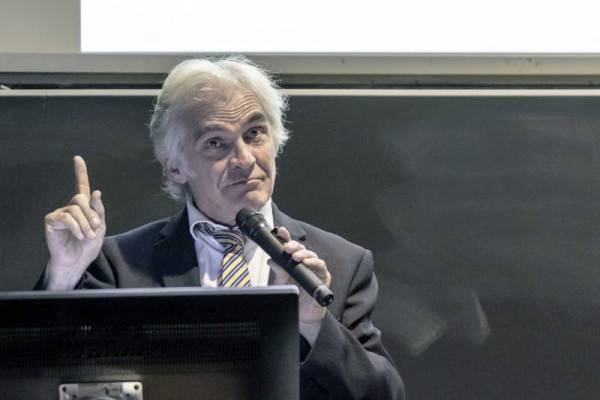Professor Tom Collins, former Head of the Royal College of Surgeons of Ireland in Bahrain, said “all medics, all over the world, should call on regimes to grant political dissenters an amnesty.”
In an interview with Fatima Yazbek from the Gulf Institute for Democracy and Human Rights, Collins noted that “prison is a huge congregation setting, we expect a very explicit effort to protect prisoners from COVID-19,” adding that “congregation setting evidently represent an enormous risk for the spread of COVID-19, and for the health and well-being of the inmates.”
“Prisoners not just in Bahrain, but in any political prison in any place in the world, right now are being placed in danger by being in prison, in a level that they will be exposed to a danger that they should not be exposed to.”
Collins confirmed “We have learned from COVID-19 a critical lesson, that healthcare is also a political issue,” indicating to a call launched by a previous health official in the UK for the resignation of PM Boris Johnson after his speech about the herd’s immunity plan.
“I think in Bahrain we have to recognize, that is primarily a political issue, as how the issue of COVID-19 is dealt with, in the prisons and possibly outside the prisons,” he stated. “This has to be questioned.”
“Internationally, Donald Trump has refused to lift pretentions on Iran. As Iran tries to come to terms with the challenging of COVID-19 in it population. In refusing to do that, it seems to me that Donald trump is changing COVID-19 into a weapon against the citizens of Iran, by not taking positive action to insure that the country is able to deal with this challenge.”
Tom Collins was the Head of the Royal College of Surgeons of Ireland in Bahrain and left his post in 2013. “I left Bahrain in 2013 where I was the head of the medical school and I was uncomfortable because I couldn’t reconcile my own ethical commitments and convictions on medical care, health care, and academic freedom with the political environment in which I found myself in Bahrain,” he stated.
Collins talked about what he witnessed in Bahrain. “I have seen trained nurses 7 years ago not provided jobs, which the explicit reason I was provided was security, however, the honest reason was their religious affiliation.”
“This is not a way that any medical system should be organized,” he noted, stressing that “this need to be documented and challenged.”
“I have no idea now about the equal access to health care in Bahrain, in the various hospitals, where everybody, regardless of political affiliation or any other identity character, whether they have free open access now.” Collins stressed that this didn’t happen while he was in Bahrain.
“On a personal level, I would very much like to see Nabeel Rajab, whom I met in Dublin in 2016, where he was working on human rights and reconciliation at the time, and was arrested and tried after returning to Manama,” Collins said.
He stressed his concern about Rajab’s health, saying “I would like to welcome him to spend the quarantine in my home in Ireland, if that helps him in any way,” noting that Rajab is “one of the thousands at risk of being imprisoned by Bahrain and other regimes in the world.”
The interview with Tom Collins comes within a series of interviews carried out by the GIDHR in the framework of #Release_Bahraini_Prisoners campaign, launched by a group of Bahraini activists on social media outlets, to call on the Bahraini authorities to release Bahraini prisoners amid serious concerns over the Coronavirus outbreak, specially that Bahrain’s prisons are still overcrowded with prisoners of conscience and political prisoners.
Source:



 العربية
العربية